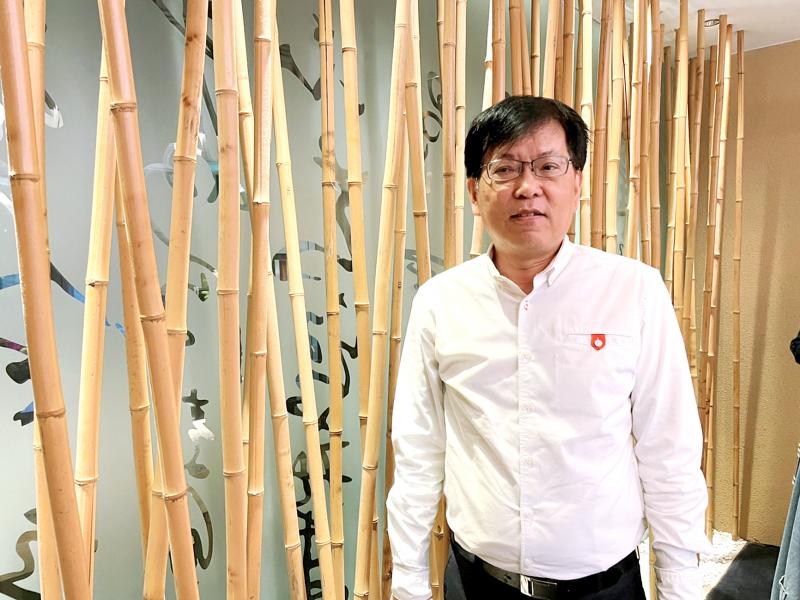Ample Electronic Technology Co (勤凱科技), which supplies conductive paste to passive components maker Yageo Corp (國巨), expects annual revenue to grow more than 10 percent this year, thanks to strong customer demand and market share gains, a company executive said yesterday.
The Kaohsiung-based company said that it is upbeat about this year’s business outlook and expects a wave of 5G smartphone demand to fuel the sale of passive components, including ceramic capacitors and molding chokes.
A 5G phone uses 25 to 40 percent more passive components than a 4G model, the company said.

Photo: Chang Hui-wen, Taipei Times
Ample is also winning market share from Japanese competitors for conductive pastes used for chip resistors, a new business area for the company, it said.
Last year’s revenue reached a record NT$1.21 billion (US$42.60 million), doubling from 2019’s NT$589 million, after sales for last month rose 70 percent annually to NT$124.14 million, the company said.
The company expects last quarter’s uptrend to carry into this quarter, despite seasonal weakness, it said.
“The first quarter is better than the seasonal pattern,” Ample chairman and president T.Y. Tseng (曾聰乙) told reporters at a media briefing in Taipei. “This year as a whole, revenue will grow every quarter.”
“Supply remains tight,” Tseng said. “To satisfy customer demand, we need to expand capacity by about 30 percent.”
Ample plans to add to the capacity of its local production lines, Ample said, citing customers who have brought production lines back to Taiwan given potential US export restrictions.
Washington is considering extending its semiconductor ban to passive components, the firm said.
Asked about trends in component prices, Ample said that it matches the moves taken by its customers.
Most passive component makers intend to keep prices unchanged, Tseng said, dismissing recent media speculation about price increases in the second half of this year.
“Recent supply constraints are not as bad as the last supply crunch, which occurred in 2018,” Tseng said.
Over the past few months, Ample said that it has begun supplying conductive pastes to a South Korean passive component maker, and has sent product samples to Japanese clients, aiming to enter the market there within three years.
Ample’s existing customers are mostly from Taiwan and China, including Yageo, Chilisin Electronics Corp (奇力新) and Walsin Technology Corp (華新科).
The firm has increased sales of its solar conductive paste, with all local solar cell companies except for Motech Industries Inc (茂迪) becoming its customers, it said.

SEMICONDUCTORS: The German laser and plasma generator company will expand its local services as its specialized offerings support Taiwan’s semiconductor industries Trumpf SE + Co KG, a global leader in supplying laser technology and plasma generators used in chip production, is expanding its investments in Taiwan in an effort to deeply integrate into the global semiconductor supply chain in the pursuit of growth. The company, headquartered in Ditzingen, Germany, has invested significantly in a newly inaugurated regional technical center for plasma generators in Taoyuan, its latest expansion in Taiwan after being engaged in various industries for more than 25 years. The center, the first of its kind Trumpf built outside Germany, aims to serve customers from Taiwan, Japan, Southeast Asia and South Korea,

POWERING UP: PSUs for AI servers made up about 50% of Delta’s total server PSU revenue during the first three quarters of last year, the company said Power supply and electronic components maker Delta Electronics Inc (台達電) reported record-high revenue of NT$161.61 billion (US$5.11 billion) for last quarter and said it remains positive about this quarter. Last quarter’s figure was up 7.6 percent from the previous quarter and 41.51 percent higher than a year earlier, and largely in line with Yuanta Securities Investment Consulting Co’s (元大投顧) forecast of NT$160 billion. Delta’s annual revenue last year rose 31.76 percent year-on-year to NT$554.89 billion, also a record high for the company. Its strong performance reflected continued demand for high-performance power solutions and advanced liquid-cooling products used in artificial intelligence (AI) data centers,

Gasoline and diesel prices at domestic fuel stations are to fall NT$0.2 per liter this week, down for a second consecutive week, CPC Corp, Taiwan (台灣中油) and Formosa Petrochemical Corp (台塑石化) announced yesterday. Effective today, gasoline prices at CPC and Formosa stations are to drop to NT$26.4, NT$27.9 and NT$29.9 per liter for 92, 95 and 98-octane unleaded gasoline respectively, the companies said in separate statements. The price of premium diesel is to fall to NT$24.8 per liter at CPC stations and NT$24.6 at Formosa pumps, they said. The price adjustments came even as international crude oil prices rose last week, as traders

SIZE MATTERS: TSMC started phasing out 8-inch wafer production last year, while Samsung is more aggressively retiring 8-inch capacity, TrendForce said Chipmakers are expected to raise prices of 8-inch wafers by up to 20 percent this year on concern over supply constraints as major contract chipmakers Taiwan Semiconductor Manufacturing Co (TSMC, 台積電) and Samsung Electronics Co gradually retire less advanced wafer capacity, TrendForce Corp (集邦科技) said yesterday. It is the first significant across-the-board price hike since a global semiconductor correction in 2023, the Taipei-based market researcher said in a report. Global 8-inch wafer capacity slid 0.3 percent year-on-year last year, although 8-inch wafer prices still hovered at relatively stable levels throughout the year, TrendForce said. The downward trend is expected to continue this year,